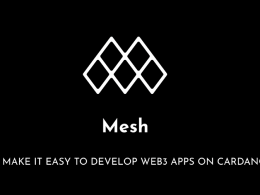Money must have certain economic properties in order to have utility as an exchange good. It must maintain its durability over time, be uniform, divisible, portable and with limited supply.
Those economic properties are: store of value, unit of account and medium of exchange, according to accepted economic theory.
In the crypto industry, it is sought to avoid volatility in order to develop foreseeable financial utility, and for this, stablecoins have been created, which seek to maintain a stable value with a reference known in the traditional world.
There are two main types of stablecoins, those backed with a fiat currency, or with commodities such as gold and silver, and algorithmic ones, which seek parity through liquidity in their protocol.
If you want to understand more about stablecoins, I have published an article on the subject some time ago(1).
The Cardano ecosystem is growing, and with it the stablecoins. In a recent article on AdaPulse by my teammate, TheStophe(2) presents a list of emerging native Cardano stablecoins, and some of them are already operational on the mainnet:
- $USDA by Emurgo (Fiat backed, KYC, regulated)
- $DJED by COTI (Ada backed, collateralized and algorithmic, IOG Designed)
- $SigUSD by Emurgo/Ergo (Erg backed, collateralized algorithmic, bridged)
- $USDM by Mehen (Fiat backed, US state regulated, token issued)
- $iUSD by Indigo (Algorithmic)
- Shareslake (Fiat backed, KYC, Cardano sidechain)
- EVM bridge or wrapped assets (Milkomeda EVM, Algorand and Solana stables, others?)
As you can see, in Cardano there is a variety of formats, of all those available in the crypto industry and for all preferences.
What Is USDM?
Mehen, a symbol of Egyptian mythology, is a protective deity depicted as a snake that coils around the sun god Ra during his journey at night. It is the snake that appears in the Ouroboros symbol, the name of the Cardano consensus protocol, and represents cyclical renewal.
The Mehen Group team understood the need for the Cardano DeFi ecosystem for a stablecoin that can be directly converted into fiat currency, and thus created USDM, a fiat-backed native Cardano stablecoin.
New users commonly join the Cardano network by going through centralized exchanges to convert their dollars into ADA. Mehen seeks to be the fiat on-ramp for the Cardano ecosystem, bringing additional liquidity directly to the blockchain.
The USDM token can be exchanged 1:1 for USD, and for this reason it promises to be a store of value in the Cardano blockchain, with audited and authorized fiduciary support, since each dollar will be deposited in a US bank account under custody , separate from the Mehen funds. Thus the Mehen Reserve will be constituted.
Mehen is committed to frequently posting USDM token portfolio holdings, stress test results, license reviews, and audits.
Backed stablecoins lose parity when the value of the assets backing the token is volatile or unknown, so they must be transparent, audited, and liquid.
The team has designed the protocol so that there is no less USD in the Mehen Reserve than USDM in circulation. Due to the nature of its structure, USDM will sometimes be overcollateralized due to interest accumulation.
USDM tokens are an unsecured debt of Mehen Finance LLC, and US consumer protection laws will govern the use of the Mehen Reserve.
The Mehen Reserve will not be used for other purposes and this makes the seizure of Mehen Reserve assets unlikely.
As a precaution against banking problems, in addition to federal deposit protections, Mehen will distribute his reserves to different banks in different legal jurisdictions, both in the United States and abroad.
The team submitted three proposals in Catalyst’s FUND9, not having received funding due to over budget in Mehen: Fiat-backed Stablecoin USDM and not having reached enough positive votes to Mehen: USDM State Regulatory Fees and Mehen: Onboarding Assistance.
Writer’s note: I asked founder Matthew Plomin if Mehen has signed, or will sign, partnerships with Cardano DEXs to be able to trade USDM on the secondary market, as this is important to be able to buy ADA, NFTs or FTs on-chain. Mr. Plomin answered me “We have had fruitful conversations with nearly every DEX in the space. We don’t have any side-agreements with any, but don’t expect much trouble on that front. I look forward to working with them to find ways to successfully work together to get the token listed. But we don’t have any announcements to make at this time.”
The Regulations
Mehen Group understands that submitting to regulations seems very ‘anti-crypto’, but proposes to see Mehen as a bridge to another system. It is like building bridges to Ergo, Ethereum or Bitcoin, which improve usability and expand the possibilities of the ecosystem. So building a direct bridge to fiat money is further interoperability with traditional finance, to achieve mass adoption.
The operating license is an important part of this business. State regulators are demanding that they comply with their obligations to guarantee client holdings, since operating money service businesses improperly, or without a required license, can face severe criminal and civil penalties.
Mehen Finance LLC will be the issuer of USDM, and will operate where legally licensed. Mehen is currently seeking licenses as a Money Transmitter in a variety of US states and territories, and is working to obtain licenses in the UK and EU to expand operations in those jurisdictions.
Depending on the jurisdiction of the user, USDM will be regulated as a stablecoin, or a digital-native stored value item (such as an eGift card), or an electronic money token, or a prepaid access token.
Like any bank, brokerage or exchange company, Mehen must verify the identity of users who interact with the platform, to ensure compliance with the OFAC and other regulatory requirements of the KYC/AML policy.
How USDM Works?
USDM will be minted and redeemed by ordinary people and institutions alike. To do this, users need to have a bank account, send USD to Mehen’s platform, and connect a Cardano wallet to mint USDM and receive it there. The same process will be done in reverse to exchange USDM for USD.
USDM will be transferred to the Cardano blockchain without using smart contracts, applying Cardano network fees, and small mint and burn fees.
To ensure that the Mehen Reserve has sufficient assets to support USDM, each minting transaction will be done with a multi-signature, which includes open oracles to verify the sufficiency of the Mehen Reserve.
User money will be deposited in a special Mehen account for token holders.
Users will need to provide an email address for application registration which will be validated, and then a Base64-encoded UUID (Universally Unique Identifier) Client ID and Base64-encoded UUID Verification ID will be generated. The verification ID is a link to the user’s email address.
The legal verification of identity will be carried out with third-party services to corroborate the authenticity of the documents, and this cost must be covered by the user. It is expected that over time it will be at a reduced cost, by scaling the number of users. Payments can be made by credit card or bank transfer, and will be required before sending the data.
The documentation provided by the users will be stored securely in an AES-256 encrypted database, and will be retained only for the time required by regulations, after the date of account dissolution.
The Mehen app will be similar to a centralized exchange, and the on-chain part of the app will be a custodial wallet that will create an internal Mehen account for each user. Said account will include a blockchain wallet address in the Cardano network for the deposit of the USDM minted by the protocol.
Mehen Finance LLC reserves the right to reject any user transaction, when the account is not up to date with legal compliance, or there is an order from government authorities to suspend the account.
The Team
Matthew Plomin: Founder of Mehen Group. CFA Chief Operations Officer. LinkedIn
Matthew is responsible for regulatory compliance, internal process controls, and business management. He has worked in fiduciary TradFi roles for nearly 15 years, most recently as global head of ABCP and US head of Money Market Credit for a large global asset manager. He is on the steering committee for ESG matters with the Structure Finance Association, and is a FreeLoaderz Core Contributor. Previously, he held roles in institutional relationship management, client onboarding, KYC/AML, and regulatory reporting.
Jillian Plomin: Chief Executive Officer. LinkedIn.
Jillian is a former Sergeant in the U.S. Army Reserves, worked for the Domestic Nuclear Detection Office in Washington D.C., and holds a Masters in Public Relations from The GW School of Political Management. Jillian has extensive experience in Communications and Advertising, and has been leading dynamic teams for decades. Jillian is also a talented writer. She is publishing her first novel, Blade of Baz on the Cardano blockchain with Project Bookworm.
You can see the rest of the team here.
Mehen is organized into four separate entities, Mehen Innovations, Mehen Finance LLC, The Mehen Foundation and Mehen DAO.
Mehen Innovations Inc.
Mehen Innovations owns and develops the software for Mehen and licenses it to Mehen Finance LLC. This organization is responsible for the broader development of the Mehen ecosystem, for managing the Mehen Reserve, and for allowing Mehen Finance LLC to stay bankrupt remotely for the safety of USDM token holders.
Mehen Finance LLC
Mehen Innovations owns and develops the software for Mehen and licenses it out to Mehen Finance LLC. This organization is responsible for the broader development of the Mehen ecosystem, managing the Mehen Reserve, and allowing Mehen Finance LLC to remain bankruptcy remote for the safety of USDM token holders. All interest from the Mehen Reserve is paid to Mehen Innovations Inc to cover operating costs, and redistribution to the Mehen Foundation.
Mehen foundation
Once the assets backing the USDM stablecoin provide sufficient income, the Mehen Foundation will be created, which will be a community-driven incubator to fund and assist projects developing on Cardano.
Mehen DAO
People who maintain Mehen accounts will be invited to join Mehen DAO.
Mehen DAO members will control which projects are funded and the selection process for project funding.
Sources: https://linktr.ee/mehenofficial
(1) Stablecoins: A Necessity for the Crypto Industry
(2) The Emerging Cardano Stablecoin Ecosystem in 2023: The Cambrian Explosion – Part 1










